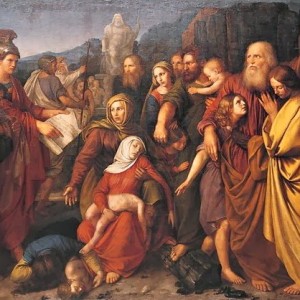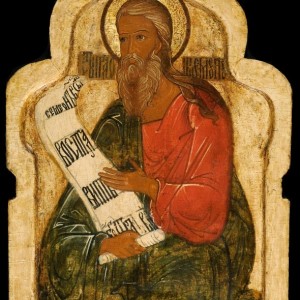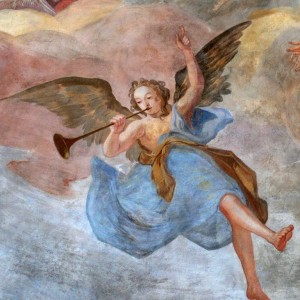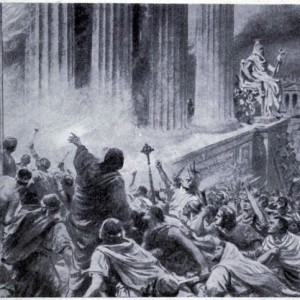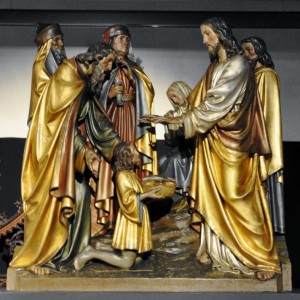Tonight’s O Antiphon is “O Sapientia,” which means “O Wisdom.” All of the first three O Antiphons are tied to the Messianic prophesy in Isaiah 11:1-5. I’ve bolded the relevant part for today’s Antiphon: Then a shoot will spring from the stem of Jesse, And a branch from his roots will bear fruit. The Spirit of the… Continue reading Day 1: O Sapientia (O Wisdom)
Author: Joe Heschmeyer
The Virgin Mary and the Indwelling of the Holy Trinity
Mikhail Nesterov, The Annunciation (19th c.) Christ promises a sort of Trinitarian in-dwelling for those who persevere in love and obedience: “If a man loves me, he will keep my word, and my Father will love him, and we will come to him and make our home with him” (John 14:23). The Immaculate Virgin Mary… Continue reading The Virgin Mary and the Indwelling of the Holy Trinity
Does 1 Maccabees Deny Its Own Inspiration?
Wojciech Stattler, Maccabees (1842) In arguing against the Deuterocanon (the so-called “Apocrypha”), Protestant apologists take frequent recourse to the following three verses from 1 Maccabees that allegedly “prove” that no prophets exist at the time that the Deuterocanon was written: “So they tore down the altar, and stored the stones in a convenient place on… Continue reading Does 1 Maccabees Deny Its Own Inspiration?
Was Christ’s Birth Preceded by 400 Years of Divine Silence?
Russian Icon, The Prophet Simeon, (17th c.) Here’s an anti-Biblical myth that many Protestants hold to, without knowing it: a belief in a so-called “intertestamental period” or “400 years of silence,” in which God allegedly (and inexplicably) ceased communicating with His People between roughly 400 or 450 B.C. and the Incarnation of Christ. GotQuestions? describes… Continue reading Was Christ’s Birth Preceded by 400 Years of Divine Silence?
Last Things First: The Two “Mini-Seasons” of Advent
Some of the Advent readings at Mass seem strangely inappropriate for the season. For example, yesterday’s Gospel began with Jesus saying, “As it was in the days of Noah, so it will be at the coming of the Son of Man.” That doesn’t seem very… “Christmasy.” Nor is this an isolated instance. In fact, a… Continue reading Last Things First: The Two “Mini-Seasons” of Advent
The Caliph’s Catch-22: Protestant Arguments Against the “Apocrypha”
There’s a story (probably legendary) about the destruction of the great Library of Alexandria: John the Grammarian, a Coptic priest living in Alexandria at the time of the Arab conquest in 641 AD, came to know ‘Amr, the Muslim general who conquered the city. The men were each other’s intellectual peers, and John became the… Continue reading The Caliph’s Catch-22: Protestant Arguments Against the “Apocrypha”
Explore Evangelii Gaudium (“The Joy of the Gospel”) With Me
Pope Francis’s new Apostolic Exhortation Evangelii Gaudium (“The Joy of the Gospel”) was released today. I haven’t had a chance to read it all yet, but I thought I’d try something a little different today. Let’s explore the document together: I’ll begin by posting a few of the passages that jump out at me. You do the… Continue reading Explore Evangelii Gaudium (“The Joy of the Gospel”) With Me
Why We Should Take John 6 Literally About Transubstantation
One of our deacons, John Staley, recently reminded me of something I’d written about the Eucharist four years ago. Since Eucharist means “Thanksgiving,” this seems like a perfect time to share it. I was prompted to writing by C. Michael Patton, a Reformed blogger. He’d written a post entitled, “Why I Don’t Buy the Roman… Continue reading Why We Should Take John 6 Literally About Transubstantation
The Awesome Power of the Five-Step “Lectio Divina” Method to Scripture
James Tissot, Jesus Teaches in the Synagogues (1886) In his 2010 encyclical Verbum Domini (“The Word of the Lord”), Pope Benedict XVI advocated a particular approach to Scripture as a key, both to our personal sanctification, and to Christian ecumenism: Listening together to the word of God, engaging in biblical lectio divina, letting ourselves be… Continue reading The Awesome Power of the Five-Step “Lectio Divina” Method to Scripture
Can Objective Morality Exist Without God? (Round 3)
Yesterday marked the conclusion of my debate with Steven Dillion on objective morality and the existence of God. Here’s everything, in case you missed any of it: Monday (11/4) – Joe’s opening statement (affirmative)Tuesday (11/5) – Steven’s opening statement (negative)Wednesday (11/6) – Joe’s rebuttal (affirmative)Thursday (11/7) – Steven’s rebuttal (negative)Friday (11/8) – Questions exchanged (three questions each)Saturday (11/9) – Answers (Joe and Steven answer each other’s questions)Sunday… Continue reading Can Objective Morality Exist Without God? (Round 3)


